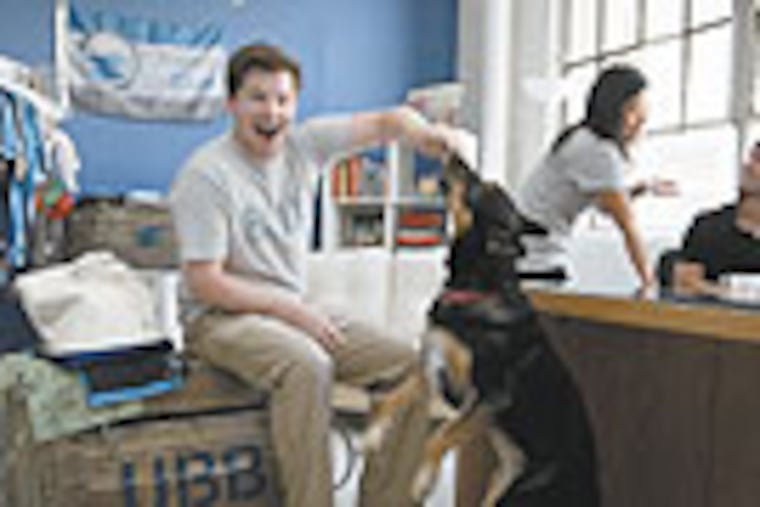Phila. entrepreneur torn by spill
Not that a guy with a passion for oceans and their inhabitants would be pleased about the worst oil spill in U.S. history.

Not that a guy with a passion for oceans and their inhabitants would be pleased about the worst oil spill in U.S. history.
Yet Brian Linton is, sort of - an admission the 23-year-old Philadelphia entrepreneur made reluctantly during a recent interview.
For, as much as the BP Deepwater Horizon crisis in the Gulf of Mexico appalls Linton, the heightened environmental awareness and call to action it has triggered could wind up benefiting his bottom line.
On May 1, Linton, who lives in Fishtown (seriously), launched United by Blue, a company based in a renovated factory at 12th and Callowhill Streets that designs and markets organic apparel and accessories.
Its mission is twofold: to make a profit and to clean up oceans, beaches, and waterways around the world. To further that second objective, United by Blue is committed to removing one pound of trash for each product it sells.
That could have great appeal for the incensed eco-shopper who happens upon Linton's website, www.unitedbyblue.com.
Still, he's conflicted.
"From a business perspective, maybe there will be benefits" to United by Blue, he said of the spill. "But if I had my way, I would rather not make a hundred thousand dollars in sales and not have that oil spill happen."
At least for that moment, the typically full-bore salesman seemed to have lost his business mojo. Then again, he's only 23 - how much of a track record could he have?
Plenty, it turns out.
Pat Arnett remembers when her grandson was a child living in Singapore and spending summers at her Cape Cod home.
"We would go to Kmart and the grocery stores and buy candy, and he would take it all home with him to Singapore," Arnett said in an interview Thursday. "He said he had to make some money."
Along with a friend, Linton would sell those packets of Sour Patch Kids and SweetTarts - U.S. delicacies typically unavailable to Asian youngsters - to his classmates for $3 each. They cost him only about 50 cents each.
"We were making hundreds of dollars and investing it in our hobby," which was raising tropical fish, Linton said. (Fish tanks were a childhood obsession, as in 30 of them.)
In another grade-school venture, Linton said, he "capitalized on the Beanie Baby phase." During a visit to China, he bought dozens of them for $1 to $2 each, then sold them to classmates in Singapore for up to $20 apiece.
His first taste of serious money would come in the summer of 2006. After his freshman year at Calvin College in Michigan, he was back on Cape Cod with his grandparents, waiting tables at Tugboats in Hyannis, when he noticed shell necklaces in nearby gift shops selling for $10. From living abroad, he knew they cost only about 50 cents to make.
He called a friend in Thailand, and not long after, Linton was in the wholesale jewelry business, talking shopkeepers on the Cape into carrying his Sand Shack line of beaded necklaces made in that country.
What Linton bought for 50 cents apiece, he sold to store owners for $3 each.
"I managed to take a $600 investment from the tips I was getting, and, by the end of the summer, Sand Shack had flipped jewelry enough to make about $10,000," Linton recalled.
Sophomore year was spent in China at the Beijing Institute of Education. Linton would devote the following summer to developing Sand Shack's website and lining up suppliers. About 80 percent of the jewelry he now sells comes from a supplier in China, he said.
Linton returned to the United States to spend his final year of college at Temple University. His experience growing up in Asia allowed him to complete his bachelor's degree in Asian studies in three years instead of four.
"I saved $20,000 in tuition and was able to use that for my business," he boasted.
He also picked up $35,000 in cash and prizes as winner of Temple's 2008 Be Your Own Boss Bowl for a proposal for an organic-lifestyle coffee shop.
"What really pushed him over the top was he answered the judges' questions so well," said Jaine Lucas, executive director of Temple's Innovation and Entrepreneurship Institute. "They could see in a heartbeat that he knew his stuff, had done all his research."
She described Linton as having "an incredible ability to read what the market is telling him . . . and adapt very quickly."
Indeed, he did. With the recession in full bloom and Starbucks closing stores in 2008, Linton "decided coffee is not where I wanted to be."
So he applied his winnings to enhancing Sand Shack's customer base, generally boutiques shopped by women in their 50s and 60s. This year, the company is expecting sales to reach $750,000 - and since 2008, Sand Shack has donated 5 percent of sales to ocean conservation.
By fall of last year, Linton decided that he wanted a business that would appeal to a younger age group, 18 to 35, and "make a huge impact on our environment."
Thus began the effort, with two employees, to create United by Blue, with its mission of actually organizing and performing cleanup work rather than simply donating money toward it.
As of Friday, United by Blue's trash-collection tally was 1,036 pounds, including 600 pounds removed from along the Schuylkill in Bartram's Garden in April, even before the company made its official debut.
If the publicity generated for United by Blue's T-shirts, bags, and jewelry at such cleanups leads to profit, Linton offers no apologies.
Profit, he said, "allows us to create a more sustainable business model to accomplish an environmental good."